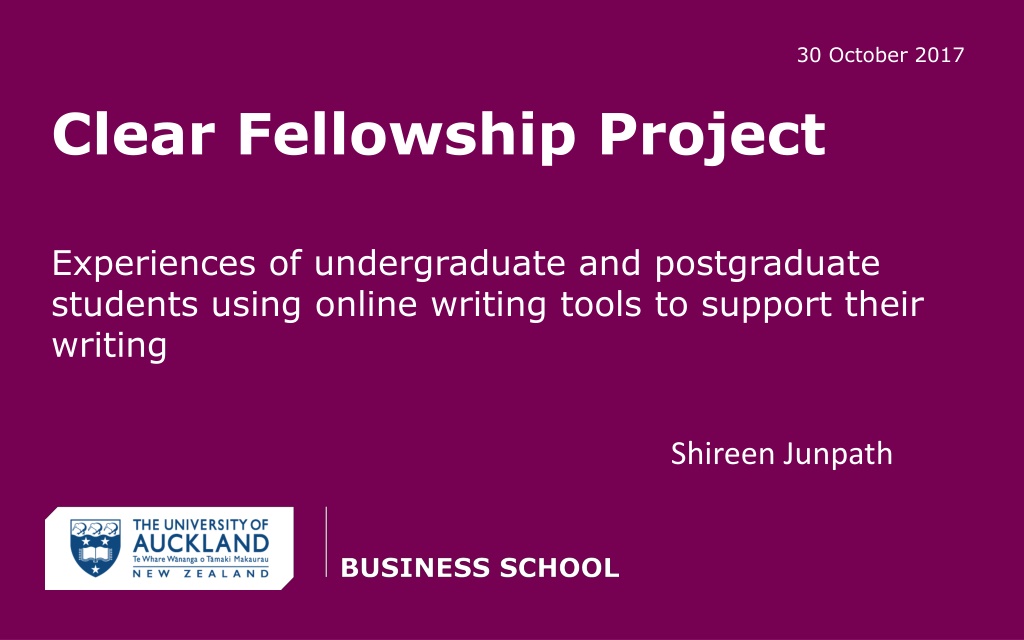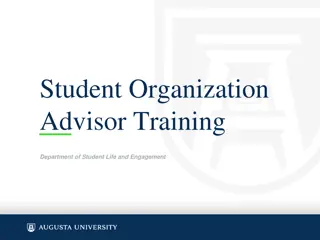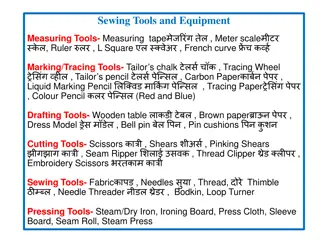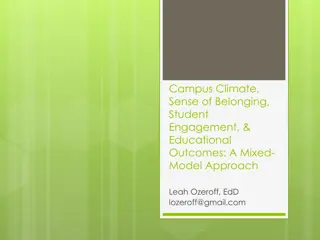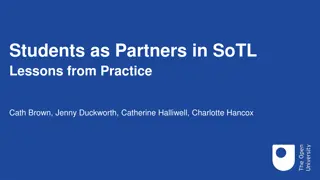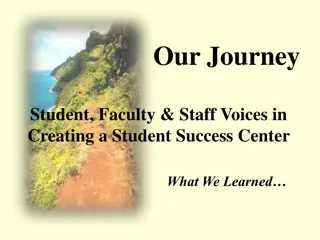Exploring the Impact of Online Writing Tools on Student Writing Experiences
This project by Shireen Junpath delves into the experiences of undergraduate and postgraduate students using online writing tools to enhance their writing skills. The study aims to understand the effectiveness of tools like Grammarly, Lextutor, and Academic Phrasebank from the perspectives of students. The research sheds light on the diverse profiles of students, common writing difficulties faced, and the significance of tools in identifying errors and improving writing quality.
Download Presentation

Please find below an Image/Link to download the presentation.
The content on the website is provided AS IS for your information and personal use only. It may not be sold, licensed, or shared on other websites without obtaining consent from the author. Download presentation by click this link. If you encounter any issues during the download, it is possible that the publisher has removed the file from their server.
E N D
Presentation Transcript
30 October 2017 Clear Fellowship Project Experiences of undergraduate and postgraduate students using online writing tools to support their writing Shireen Junpath
Aims understand of the effectiveness of online writing tools such as Grammarly, Lextutor , Academic Phrasebank and others captures the students perspectives on using these tools to support their writing 2
Context UG Profile (students enrolled in first year papers) About a third are identified from the DELNA screening as diagnosis required About 40% of the cohort are L2s (second language learners) PG Profile (PG Dip, MBA, MCom, BCOM(Hon), MBA(Engineering),PhD) Diverse group of L2s, those who are coming back to study after a long break and those who may not have an undergraduate degree 3
Some writing difficulties Poor organisation/poor paragraphing Lack of cohesion Use of connectives (inadequate) Lack of academic style Significant errors in expression Incomplete sentences Inadequate vocabulary 4
UG & PG 5
Tools Identifies over 250 grammar errors 6
Some universities that use Grammarly Flinders universit Curtin university 7
example 10
Missing article This highlights the importance of proofreading in the writing process. 11
Grammarly activity Grammarly activity sem 2 2016 and sem 1 2017 25000 20000 15000 10000 5000 0 Month 1 Month 2 Month 3 Month 4 Month 5 Month 6 Sem 2 2016 Sem 1 2017 13
Academic Phrasebank http://www.phrasebank.manchester.ac.uk 14
Lextutor https://www.lextutor.ca/vp/eng/ Lexical text analysis 15
Turnitin erater 16
Skills hub activity Sum of Views PG Sem 1 2017 Contact Us The Academic Skills Team is here to help! Course grades Writing Essays & Reports The writing resources/tools were among the top 10 pages accessed by both PG and UG students Learn to use GREAT WRITING TOOLS and Even More Support at UoA Advice from Successful Masters Students Deal with Difficult Readings - Rewordify & Use More Academic Words - Vocabprofile Academic Writing - General APA Referencing Skills Hub - PG Join a Workshop Online Writing Feedback - Turnitin Correct mistakes in your Writing - Course Announcements Course assignments Turnitin - Submit your draft here Course modules Course Home 0 500 1000 1500 2000 2500 3000 3500 17
What do students say about the tools? 18
Which tools do you use to support your writing? Which tools do you use to support your writing? Implications: Highest level of engagement with Grammarly. Minimal engagement with lextutor. Turnitin and Academic Phrasebank are mainly used by PG students. Turnitin 40% Lextutor 10% Academic Phrasebank 40% Grammarly 95% 0% 20% 40% 60% 80% 100% 19
How useful have you found these tools? How useful have you found these tools? Very useful/useful 5% 10% Neutral Not useful Not used 85% 20
Why do you use these tools? Definitely/Yes TO ORGANISE MY IDEAS 60% TO HELP ME THINK CLEARLY 60% TO CHECK MY WORK 80% BUILD MY CONFIDENCE 60% 0% 20% 40% 60% 80% 100% 21
How have these tools helped? notice how phrases are used improved my academic writing style Implication Addresses some of the key issues identified by DELNA helped me to embed sources more effectively use fewer awkward phrases improved my academic vocabulary more writing accuracy 22
What do students say about Grammarly? It helped my writing from my first paper to now makes you read over more makes you think about your writing My criticism is that it missed actual errors comma in the wrong place. Instant feedback I didn t accept some suggestions Makes you notice things commas Implications this needs to be explored further shows an awareness not to accept all the suggestions Implications Grammarly feedback is immediate it makes students think about their writing. 23
Turnitin Academic Phrasebank Turnitin is good - when I paraphrased an article it alerted me when I was not paraphrasing enough. Really liked the embedding sources section and suggestions for reporting verbs TEXT TEXT HERE HERE Was amazing - It helped me think about my sentences Feedback from tutor was more valuable. Implications students benefit from using the tools by learning to paraphrase more effectively Tutor comments valued Implication Provides the scaffolding required not only for second language learners but native speakers as well 24
Summary Strengths of the study Majority of students found these tools very useful Good formative feedback Can be used as a diagnostic tool to support student academic writing Limitations Small study but rich student narrative A few highlighted some limitations which may be explored further to support student writing Wider implications Create a greater awareness within the Business School and the wider university of the available resources The challenge is how best to support student academic writing through the effective use of these tools and nurture writing independence in the higher education context 25
References Arkoudis, S. (2008). Taking the role of English language seriously in higher education: Why is it so difficult? Retrieved from www.cshe.unimelb.edu.au/downloads/Sem30Jun2008Slides.pdf. Chodorow, M., Gamon, M., &Tetreault, J. (2010). The Utility of Article and Preposition Error Correction Systems for English Language Learners: Feedback and Assessment. Language Testing 27(3) . 419-436. Print. Chodorow, M., Dickinson, M., Israel, R. and Tetreault, J. (2012). Problems in Evaluating Grammatical Error Detection Systems. Proceedings of COLING: Technical Papers. Mumbai, India: COLING, 611-628. Conroy, M.A. (2010). Internet tools for language learning: university students taking control of their writing. Australasian Journal of Educational Technology 26(6), 861-882. Coxhead, A. (2000). A new academic word list. TESOL Quarterly, 34, 213 238. Davies, M. (2008). The Corpus of Contemporary American English: 450 million words, 1990-present. Retrieved from http://corpus.byu.edu/coca/. Davis, M., & Morley, J. (2011). The role of reusable phrases in postgraduate writing: Multidimensional perspectives. In S. Etherington (Ed.), English for specific purposes (pp. 69 75). BALEAP 2009 Conference Proceedings, Reading. Reading: Garnet. Davis, M., & Morley, J. (2013). Use your own words! Exploring the boundaries of plagiarism in re-usable phrases. In J. Wigglesworth (Ed.). EAP withintheHigher Education garden: Cross pollination between disciplines, departments and research (pp. 85 94). BALEAP 2011 Conference Proceedings, Portsmouth. Reading: Garnet. Gamon, M., Chodorow, M., Leacock, C. and Tetreault, J. (2013). Grammatical Error Detection in Automatic Essay Scoring and Feedback. Handbook of Automated Essay Evaluation: Current Applications and New 19 Directions (pp.251-266) In M. D, Shermis & J. Burstein(Eds). New York, NY: Routledge. Gauthier, M. (2013). Anglophone high school boys engagement and achievement in editing their French writing using the BonPatronPro. Journal of Classroom Research in Literacy, 6, 24-35. Hyland K. (2007).Genre pedagogy: Language, literacy and L2 writing instruction. Journal of Second Language Writing, 16, 148 164. Na-Rae, H., Chodorow, M., & Leacock, C. (2006). Detecting Errors on English Article Usage by Non-Native Speakers. Natural Language Engineering 12(2), 115-129. Jones, S., Myhill, D., & Bailey, T. (2013). Grammar for writing? An investigation of the effects of contextualised grammar teaching on students writing. Reading and writing, 26(8), 1241-1263. doi: 10.1007/s11145-012-9416-1 Nation, I. S. P. (2006). How large a vocabulary is needed for reading and listening? The Canadian Modern Language Review, 63, 59 81. Perelman, L. (2016). Grammar checkers do not work. A Journal of writing centre scholarship. 40 (7-8). Swales, J. M., & Feak, C. B. (2012). Academic writing for graduate students: Essential tasks and skills (3rd ed.). Ann Arbor: University of Michigan Press. Swales, J. M., & Feak, C. B. (2001). Academic Communications and the Graduate Student. Pedagogy, 1(1), 176. Qassemzadeh, A., & Soleimani, H. (2016). The impact of feedback provision by grammarly software and teachers on learning passive structures by Iranian EFL 26 learners.Theory and Practice in Language Studies, 6(9), 1884-1894. doi:http://dx.doi.org.ezproxy.auckland.ac.nz/10.17507/tpls.0609.23
